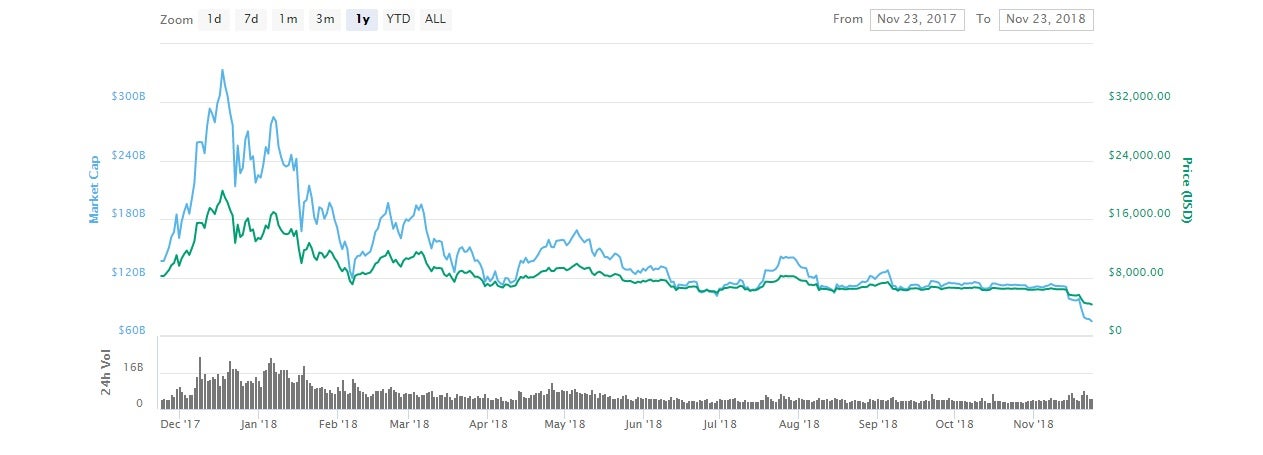Why the 2018 bitcoin price crash is just a blip not a bubble bursting, claim cryptocurrency experts
'I do not believe we are, or were, anywhere close to a bubble with cryptocurrency'
Your support helps us to tell the story
From reproductive rights to climate change to Big Tech, The Independent is on the ground when the story is developing. Whether it's investigating the financials of Elon Musk's pro-Trump PAC or producing our latest documentary, 'The A Word', which shines a light on the American women fighting for reproductive rights, we know how important it is to parse out the facts from the messaging.
At such a critical moment in US history, we need reporters on the ground. Your donation allows us to keep sending journalists to speak to both sides of the story.
The Independent is trusted by Americans across the entire political spectrum. And unlike many other quality news outlets, we choose not to lock Americans out of our reporting and analysis with paywalls. We believe quality journalism should be available to everyone, paid for by those who can afford it.
Your support makes all the difference.The price of bitcoin has often been compared to history's biggest bubbles – Dutch Tulip mania in the 17th century, the Mississippi Bubble in the 18th century and the UK Canal and Railway mania in the 19th century – but perhaps the most popular comparison is the dot-com bubble of 2000.
In the space of five years, it seemed any company with a '.com' after its name provoked a feeding frenzy from investors, which led to an artificial inflation in their value. When the bubble inevitably burst, the implosion saw more than $1.7 trillion wiped from their market value, just months after the peak.
Since December 2017, the market cap of bitcoin has followed a similar trajectory, albeit on a much smaller scale. Two recent flash crashes in the space of a week have taken bitcoin's total losses above $250 billion, representing a 77 per cent drop in less than 12 months.
But despite the similar pattern, market analysts believe it is erroneous to draw a direct comparison between the two.
"I wouldn't compare the current state of the crypto market to the dot-com bubble," Angel Versetti, CEO of the blockchain technology firm Ambrosus, told The Independent. "While there are similarities in terms of overvalued new technology startups with unproven or unsustainable business models that were incessant in both dot-com and crypto, the sheer scale of crypto and dot-com businesses are not comparable. I do not believe we are, or were, anywhere close to a bubble with cryptocurrency.
"We are experiencing a strong correction, but the bubble has not formed yet. All the bankers and financiers jumping onto the crypto train signal that the bubble is yet to come. I think when all cryptocurrencies and tokens will be worth 15-20 trillion USD, that will be a bubble."

Bubbles can only be identified in retrospect, so it may be too soon to call the latest price collapse a bubble bursting. Looking at bitcoin's volatile history, the falls from the heights of late 2017 represent only the fourth biggest price adjustment in bitcoin's 10-year history.
Cryptocurrency experts also note that one of the biggest casualties of the dot-com bubble was Amazon, which saw its shares fall from $300 in 1998 to $6 in 2000.
Amazon's share price is now more than $1,500, having become only the second company in history to reach a market value of more than $1 trillion. This is thanks to the fact that it was fundamentally a great business idea and was eventually able to fulfil its potential.
"Of course commentators have drawn comparisons between the current bear market and the dot-com bubble of the 1990s," said Matthew Newton, an analyst at the online investment platform eToro.
"While this is inevitable, I'd venture to suggest it's not particularly useful – it's a bit like proclaiming the end of the FTSE 100 at the end of 2008. One of the benefits of a bear market is it weeds out people who are looking to make a quick buck, and aren't interested in the underlying technology. Those who understand the technology and see its benefits tend to stick around, adding value to the market."
In order for the benefits of the underlying technology to be realised and the price of bitcoin to stabilise and eventually rise again, many within the cryptocurrency industry have called for greater regulatory oversight in order to boost investor confidence.
"Having oversight of the cryptocurrency 'Wild West' will legitimise, and subsequently stablise the industry, which will allow it to reach the next step of maturity," said Herbert Sim, chief commercial officer of the cryptocurrency exchange Cryptology.
"Institutions and governments alike are beginning to accept that cryptocurrencies are likely to become an integral part of the financial system. Regardless of price moves, it's clear that the cryptocurrency community is here to stay, with institutions offering new modes of trading such as options, futures and trading on margins.
"The last few months have seen the beginnings of clear initiatives from the FCA and SEC to build out a coherent policy – it's just a shame it's taken this long for them to get on board."

Join our commenting forum
Join thought-provoking conversations, follow other Independent readers and see their replies
Comments